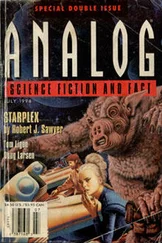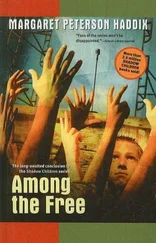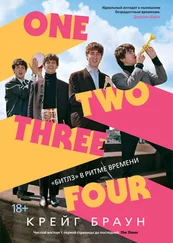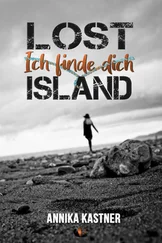Stephie hurries home, running most of the way. As she opens the door she hears the clock chime once: three-fifteen.
Aunt Märta comes out of the kitchen. She doesn’t seem upset. In fact, she almost looks happy.
“Come along, now,” she says, leading Stephie back through the kitchen and into the front room.
A man is sitting in the rocking chair. When Stephie enters the room he rises and walks toward her. He has on blue workingman’s trousers and a knitted sweater. The hand he extends is large, warm, and calloused. His face is sunburned and lined. The clothes he’s wearing smell fishy.
“Uncle Evert,” Aunt Märta explains.
“Stephie,” says Stephie.
“I wish you a warm welcome to our home,” the man says in a soft voice.
“Thank you,” Stephie replies in Swedish.
“She understood, Märta! Did you hear that? She understood me!”
“Yes, she’s beginning to pick up a few words,” Aunt Märta replies. Then she goes into the kitchen to prepare dinner.
Uncle Evert sits back down in the rocking chair. Stephie takes a seat opposite him, and they consider each other. Uncle Evert has bright blue eyes that give Stephie the impression he can see right through her and out into the wide world. Almost as if he has been staring at the ocean for so long it has taken up residence in his eyes.
Eventually Uncle Evert breaks the silence. He speaks slowly, ransacking his memory for German words.
“Ich… Fischer.” He points to the ocean. “Farhren weit… mit Boot.”
Stephie nods eagerly. Uncle Evert’s German is almost worse than her Swedish, but she understands what he means. That he’s a fisherman and has been off on the ocean with his boat.
Tentatively, they converse in a combination of Swedish, German, and sign language. Stephie tells him that her father is a doctor and her mother was an opera singer when she was young, before she had a family. Uncle Evert explains that he started out as a sailor, which was how he learned a little German a long time ago.
“ Hamburg,” he says. “ Bremerhaven, Amsterdam.” And Stephie understands that he is telling her the boat he worked on traveled to the big ports in northern Germany and Holland. This is the first time since she arrived on the island that she has been able to talk with someone other than Nellie. She wishes they could go on talking all the way to bedtime.
“Evert,” Aunt Märta calls from the kitchen. “Dinner’s almost ready.”
Uncle Evert gets up. “Wash… waschen…,” he says, pointing to his work clothes. He vanishes up the stairs.
Stephie goes into the kitchen to set the table. Three plates, three glasses, three forks, and three knives, instead of the usual two.
Something hard bumps against her left thigh. The china dog! She’s forgotten all about it. What if it breaks! Or what if Aunt Märta notices the bulge in her pocket and asks what it is. She has to hide it in a safe place. As soon as she hears that Uncle Evert has stopped making noise at the washstand and has gone into his bedroom, Stephie extends her hands toward Aunt Märta and imitates his word.
“Wash…”
Aunt Märta nods approvingly. Stephie rushes up the stairs and into her room. Wrapping Mimi in a handkerchief, she hides the china dog at the very back of the bottom dresser drawer, along with her most treasured possessions. Then she hurries out and washes her hands.
At the table, hands folded, she and Uncle Evert listen to Aunt Märta say grace.
“Come, Lord Jesus, be our guest. Let this food for us be blessed.”
“Amen,” all three of them conclude.
While they eat, Aunt Märta and Uncle Evert talk about his fishing trip and about the news on the island during his absence. Stephie grasps a word here and there. She pokes around at her portion of cod, removing the slimy gray skin and mashing the fish with her potatoes and gravy. The whole thing becomes an unappetizing white mess.
As usual, she rinses down her bites of food with milk, and as usual her milk glass is empty long before her plate is. She rehearses silently several times before trying out her new Swedish phrase, the one she heard little Elsa say just a few hours earlier.
“Would you please pass the milk?”
Aunt Märta’s chin drops, and she stops talking mid-sentence.
“Well, I never…!” Uncle Evert exclaims. “Just listen to that perfect Swedish!”
“She’s a quick learner,” Aunt Märta adds, passing Stephie the milk pitcher.
“That’s good.” Uncle Evert smiles encouragingly from across the table. “It won’t be long until you sound just like the rest of us when you speak Swedish. Then you’ll be able to go to school.”
Stephie doesn’t really catch his meaning. But she does recognize the Swedish word for school.
“Please,” she says. “School.”
She thinks about her old school in Vienna. Her real school, where she was the top student in her class and always got gold stars for her assignments. Where her teacher liked her-or at least Stephie believed so, until one day in March last year.
The day after the German army invaded Vienna, her teacher came to school with a swastika pinned to her pretty blazer.
“Heil Hitler!” she began the day by saying to the class. No more “Good morning, children.”
“Heil Hitler!” some of the students responded, raising an arm in the prescribed salute. Others just stared, unsure as to what the teacher expected of them.
They soon learned. From that day on, she told them, they were all expected to start the day with “Heil Hitler!” All but the Jewish children, that is, who were not allowed to perform the Hitler salute. For that reason, the teacher told them, they must sit apart, in the back row of desks, so she could be sure that all the German children, and none of the Jewish ones, were doing the salute correctly.
An incredulous mumble rose from the room. What was she saying? Could she possibly mean it?
“Well…?” their teacher said, a stern expression on her face. “Did you hear me?”
The class monitor, Irene, got up, taking her books from her desk, and moved from the front row to an empty desk in the far corner at the back of the room. A few others followed. Some of the children who had always sat in the back row left their desks and moved forward to the ones now free. Stephie and Evi didn’t budge from their seats, which were directly in front of the teacher’s lectern.
“You, too, Stephie!” her teacher said sharply. “And Evi.”
“But I’m not Jewish,” Evi cried. “My mother’s Catholic.”
“That makes no difference,” the teacher said coldly. “Go sit at the back.”
Evi got up from behind her desk and rushed out of the room, slamming the door behind her. There was total silence.
“Come, now,” the teacher said to Stephie. “Do as you’re told.”
Stephie gathered up her books and moved to an empty desk at the back. The teacher then picked up a piece of chalk and, without another word, started writing arithmetic problems on the blackboard.
“What are you sitting there dreaming about?” Uncle Evert asks kindly.
“Don’t play with your food,” Aunt Märta scolds at the same time.
Stephie snaps back to the present. Looking down at her plate, she’s surprised to see that she has been drawing something in her mashed potatoes with her fork. A star. Like the gold stars in her assignment books. Like the star of David that stands for “Jewish.” Quickly she gives her mashed-up food a stir and begins to eat again.
Uncle Evert stays home for two days. When he leaves again Stephie goes along to the harbor to wave goodbye. The fishing boat has a crew of six. The youngest member, Per-Erik, isn’t much older than Stephie, and when the two are introduced, Per-Erik shyly looks away. Auntie Alma’s husband, Sigurd, is also a member of the crew.
Читать дальше











